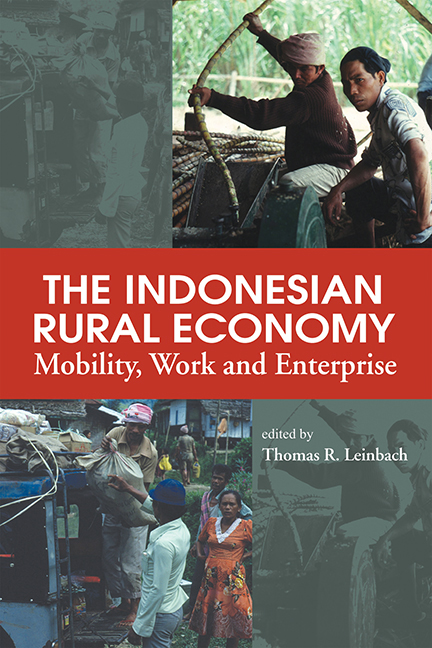Book contents
- Frontmatter
- Content
- List of Tables
- List of Figures
- Contributors
- Acknowledgements
- Glossary
- Foreword
- Part I The Development Context
- Chapter 1 The Indonesian Rural Economy
- Chapter 2 The Changing Importance of Off-Farm Income for Agricultural Households in Indonesia
- Chapter 3 The Economic Policy Environment for Small Rural Enterprises in Indonesia
- Chapter 4 The Contribution of Household and Small Manufacturing Establishments to the Rural Economy
- Part II Entrepreneurship, Gender and Mobility Issues
- Part III Indonesia's Rural Non-Farm Economy: Case Studies and Policy Development
- Index
Chapter 3 - The Economic Policy Environment for Small Rural Enterprises in Indonesia
from Part I - The Development Context
Published online by Cambridge University Press: 21 October 2015
- Frontmatter
- Content
- List of Tables
- List of Figures
- Contributors
- Acknowledgements
- Glossary
- Foreword
- Part I The Development Context
- Chapter 1 The Indonesian Rural Economy
- Chapter 2 The Changing Importance of Off-Farm Income for Agricultural Households in Indonesia
- Chapter 3 The Economic Policy Environment for Small Rural Enterprises in Indonesia
- Chapter 4 The Contribution of Household and Small Manufacturing Establishments to the Rural Economy
- Part II Entrepreneurship, Gender and Mobility Issues
- Part III Indonesia's Rural Non-Farm Economy: Case Studies and Policy Development
- Index
Summary
Introduction
Indonesia's 1999–2004 State Policy Guidelines (GBHN) provide the broad policy and direction for the country's president. Under the current guidelines, which are used to draw up the annual development plans (Repelita) and the state budget, high priority is given for the development of small and medium enterprises (SMEs) and cooperatives within a free market framework. Furthermore, the current GBHN emphasizes a need to promote industry to support agriculture and to eliminate barriers to domestic and international trade. In respect to SMEs, the current Guidelines do not greatly depart from previous GBHN. Over the life of the New Order, almost all the five-year guidelines contained policies extolling the virtues of SMEs and directing the President to give them special attention. A reasonable person would assume that despite a certain amount of slippage between the Guidelines and their implementation, the policy environment in Indonesia should overwhelmingly favour rural SMEs. The reality, however, is quite the opposite. This chapter will argue that since the beginning of the New Order, the economic policy environment and outcomes for rural SMEs have been very mixed.
To add to the confusion, even the most casual observer can't help but notice Indonesia's current turmoil. Not since the mid-1960s has Indonesia undergone such dramatic changes. From late 1997, every analyst has pointed to tremendous financial, economic, political and social changes that are taking place. In relation to the rural SMEs policy environment, important changes include:
declining real incomes for public servants,
declining national and regional budgets, greater accountability required from public servants,
rapidly changing financial support programmes for SMEs,
a range of new policies focusing on reducing corruption and increasing competition and transparency,
local governments creating regional trade barriers, primarily through taxation,
the 1999 decentralization and fiscal devolution policies,
rapidly changing national subsidy and taxation policies for basic commodities and production inputs crucial for rural SMEs.
A history of mixed signals from progressive macro-planners and micro-policy implementers as well as recent changes in the policy environment has provided a mixed and confused policy picture for rural SMEs.
- Type
- Chapter
- Information
- The Indonesian Rural EconomyMobility, Work and Enterprise, pp. 38 - 60Publisher: ISEAS–Yusof Ishak InstitutePrint publication year: 2003

